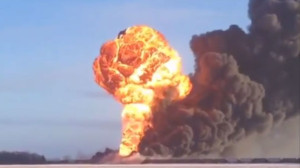After several major accidents involving crude oil trains derailing and exploding, the National Transportation Safety Board [NTSB] is warning that “major loss of life” could result from an accident if tougher regulations on oil-by-rail shipments are not implemented.
The NTSB’s recommendations were echoed by the Transportation Safety Board of Canada. Regulators in both countries are urging their governments to adopt stricter rules.
The NTSB’s recommendations on Thursday came just days after a train derailed in Philadelphia, and just weeks after a train exploded in North Dakota. These two accidents are just the latest in a string of accidents that have happened over the last seven months, the worst killing 47 people in Canada.
“The NTSB is concerned that major loss of life, property damage and environmental consequences can occur when large volumes of crude oil or other flammable liquids are transported on a single train involved in an accident,” said the NTSB in a press release. “Crude oil shipments by rail have increased by over 400 percent since 2005.”
Philadelphia had a close call on Monday when seven of the train’s 101 cars slide off the rails – including tankers carrying oil from North Dakota – on a bridge over the Schuylkill River, a tributary of the Delaware River. Luckily none of the oil spilled out, but other communities across the United States and Canada have not been so lucky.
Last July, a runaway train carrying Bakken crude oil derailed and exploded in the center of the Quebec town of Lac-Magantic, killing 47 and destroying 30 buildings.
Last November, 30 cars of another 90-car train carrying Bakken crude derailed in rural Alabama, sending more than a dozen of the cars into flames before being extinguished several days later. No one was injured or killed in this accident.
On December 30th, a train carrying crude oil from the Bakken shale derailed outside of Casselton, North Dakota. Residents reported several loud explosions that sent huge fireballs into the sky. Authorities urged residents within five miles of the explosion to evacuate and avoid contact with the smoke, while residents living 10 miles away were asked to stay indoors.
The common theme between all of these accidents is that they were all carrying crude oil from the Bakken shale formation. The Pipeline Hazardous Material Safety Administration [PHMSA] issued a safety alert earlier this month warning that “crude oil being transported from the Bakken region may be more flammable than traditional heavy crude oil.”
North Dakota crude from the Bakken shale region has a very low density, or ‘light’, meaning it contains more volatile compounds that may account for its explosive properties. Some of the explosive elements may be linked to fracking chemicals. Hydraulic-fracturing, or commonly known as fracking, is the process of sending high pressured burst of water, sand and chemicals into the ground to break up formations and free the oil or gas trapped inside. Fracking uses up to 600 chemicals. Many of them are considered proprietary company secrets.
North Dakota is home to an enormous shale oil boom that produces nearly one million barrels of oil a day. Because of the lack of pipelines in the area, a vast majority of the oil is loaded onto trains and shipped.
“The large-scale shipment of crude oil by rail simply didn’t exist ten years ago, and our safety regulations need to catch up with this new reality,” said NTSB Chairwoman Deborah A.P. Hersman. “While this energy boom is good for business, the people and the environment along rail corridors must be protected from harm.”
On Thursday, the NTSB issued three recommendations to the Federal Railroad Administration and PHMSA:
- Require expanded hazardous materials route planning for railroads to avoid populated and other sensitive areas
- Develop an audit program to ensure that rail carriers that carry petroleum products have adequate response capabilities to address worst-case discharge of the entire quantity of product carried on a train
- To audit shippers and rail carriers to ensure that they are properly classifying hazardous materials in transportation and that they have adequate safety and security plans in place
The NTSB has also called for changes in the DOT-111 tank cars, which were involved in the oil train disaster in Quebec. Regulators have faulted the DOT-111’s as being “prone to puncture.”
In August, U.S. regulators called for increased inspections in North Dakota, dubbed “Bakken Blitz,” where regulators inspected trains carrying crude oil to ensure that the shale oil is being properly classified, based on its chemical properties, prior to transport. Earlier this month, U.S. regulators said that they will widen their study to try and figure out what makes Bakken crude more flammable than other crudes.
Right now, North America is in the middle of the biggest oil and gas boom in decades. New regulations are needed to protect communities, first responders and the environment.
At Public Citizen, we would prefer that these activities be scaled back and replaced with clean, renewable energy energy sources such as wind and solar.



